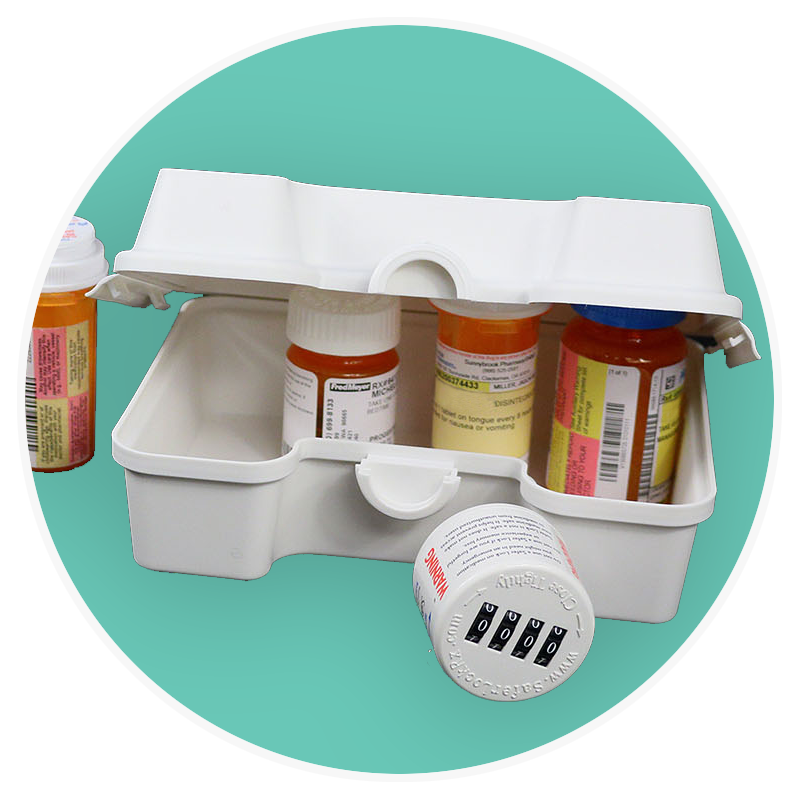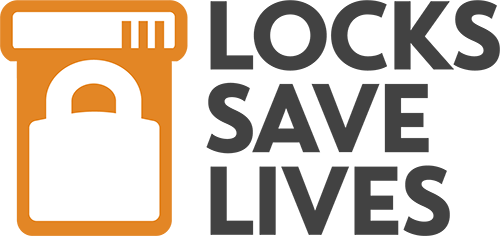YOU can save a life by locking up your prescription meds
FOR YOUR KIDS’ SAKE:
PLEDGE TO LOCK YOUR MEDS
Ease of access is the #1 reason youth misuse prescription drugs—75 percent of opioid misuse starts with using medication that wasn’t prescribed for them-usually taken from a friend or family member. A national study indicated that 29 percent of parents with children 18 years-of-age and younger report storing medications safely in the home-in a latched or locked location. We can do better.
Together, we can achieve 100%. For your kids’ sake, pledge to lock your meds. It’s easy and important!

Locking up medications is easy…and important!
Prescription opioids are a growing cause of overdose and youth are at risk of misusing opioid medications. The #1 reason youth misuse prescription drugs is ease of access.
More than half of young adults who misuse prescription opioids got them from a friend or family member.
7% of WA state 12th graders misused prescription drugs in the past 30 days—that’s 1.5 times higher than the national average.
Sources: 2018 Washington Healthy Youth Survey; 2018 Monitoring the Future National Survey
Opioids play a role in 1 in 5 deaths among young adults.
Source: JAMA Network Open. 2018:e180217
29% of parents with children 18 years of age and younger report storing medications safely in the home—in a latched or locked location.
Source: Pediatrics, March 2017
What is an Opioid?
Opioids are a specific class of drugs commonly used to reduce pain. The illegal drug heroin is an opioid, as are many pain relievers prescribed by doctors. Opioids can negatively affect the reward center in the brain. Over time, a user may need more and more, making these drugs highly addictive.
Source: National Institute on Drug Abuse for Teens
It was prescribed to YOU.
For Your Kids’ Sake, Keep it That Way.
Beneficial when used according to a doctor’s instructions, opioid pain medications should be taken only by the person for whom a doctor has prescribed them. Using prescription medicine prescribed for others or without doctor’s orders is unsafe and illegal. Prescription drug misuse, which includes opioids, is among the fastest growing drug problems in the United States. The vast majority of this misuse is due to prescription opioids. Emergency room visits related to this very powerful medicine have nearly tripled over the last decade.
Click here for more of what you need to know about opioid prescription pain medications.
What is an Opioid?
Opioids are a specific class of drugs commonly used to reduce pain. The illegal drug heroin is an opioid, as are many pain relievers prescribed by doctors. Opioids can negatively affect the reward center in the brain. Over time, a user may need more and more, making these drugs highly addictive.
Source: National Institute on Drug Abuse for Teens
It was prescribed to YOU.
For Your Kids’ Sake, Keep it That Way.
Beneficial when used according to a doctor’s instructions, opioid pain medications should be taken only by the person for whom a doctor has prescribed them. Using prescription medicine prescribed for others or without doctor’s orders is unsafe and illegal. Teenagers misuse opioid pain medications more than any other prescription medicine. Emergency room visits related to this very powerful medicine have nearly tripled over the last decade.
Click here for more of what you need to know about opioid prescription pain medications.
What can I do?
It’s as easy as 1…2…3!

Lock Up Prescription Meds
Locking up prescription medications at home is easy…and important! Keep medications out of medicine cabinets and out of your kids’ reach by storing medications in a secured location. Partnership for Drug-Free Kids reports two-thirds of teens who misused prescription pain medications in the past year say they got them from a friend or family member’s home medicine cabinet, making it important to safeguard prescription medicine in the home. Secure storage and safe disposal of medications diminish opportunities for easy access and are the most effective deterrents to accidental poisonings, overdose, medicine theft, and misuse that can lead to prescription drug addiction.. It can protect your loved ones and provide you peace of mind. Unsure how to secure your prescription medications at home, check out these medication locking devices: Safer Lock Box, Locking bags, Pill Pod Lock Box, and Rev-A-Shelf Cabinet Locks.

Educate and Communicate
Talk with your kids. Parents, grandparents and guardians have an incredibly important role to play. We can all take action by having frequent conversations with the kids and young adults in our lives about the dangers of misusing prescription drugs. Conversations are one of the most powerful tools parents and caregivers can use to connect with — and protect — their kids. Kids who learn at home about the risks of misusing and abusing drugs and alcohol, including prescription drugs, are less likely to use substances than those who do not get that critical message from their loved ones. Tips for Talking and What to Say to Prevent Drug and Alcohol Abuse >

Dispose Medications Properly
Using take-back programs to safely and properly dispose of unwanted, unused and expired prescription and over-the-counter medications keeps these medications out of the hands of kids and out of our waterways and the environment. Wondering where to find a medication take-back location near you? For safe and FREE take-back locations in SW Washington click here or find a take-back location near you at Medication Take-Back Locator.

Lock Up Prescription Meds
Locking up prescription medications at home is easy…and important! Keep medications out of medicine cabinets and out of your kids’ reach by storing medications in a secured location. Partnership for Drug-Free Kids report two-thirds of teens who misused prescription pain medications in the past year say they got them from a friend or family member’s home medicine cabinet, making it important to safeguard prescription medicine in the home. Secure storage and safe disposal of medications diminish opportunities for easy access. It can protect your loved ones and provide you peace of mind. Unsure how to secure your prescription medications at home, check out these medication locking devices: Safer Lock Box, Locking bags, Pill Pod Lock Box, and Rev-A-Shelf Cabinet Locks.

Educate and Communicate
Talk with your kids. Parents, grandparents and guardians have an incredibly important role to play. We can all take action by having frequent conversations with the kids and young adults in our lives about the dangers of misusing prescription drugs. Conversations are one of the most powerful tools parents and caregivers can use to connect with — and protect — their kids. Kids who learn at home about the risks of misusing and abusing drugs and alcohol, including prescription drugs, are less likely to use substances than those who do not get that critical message from their loved ones.
Tips for Talking and What to Say to Prevent Drug and Alcohol Abuse >

Dispose Medications Properly
Using take-back programs to safely and properly dispose of unwanted, unused and expired prescription and over-the-counter medications keeps these medications out of the hands of kids and out of our waterways and the environment. Wondering where to find a medication take-back location near you? For safe and FREE take-back locations in SW Washington click here or find a take-back location near you at Medication Take-Back Locator.
If you think your child or someone you know may be misusing prescription opioids or other substances, please visit www.waRecoveryHelpLine.org or call 1-866-789-1511.
